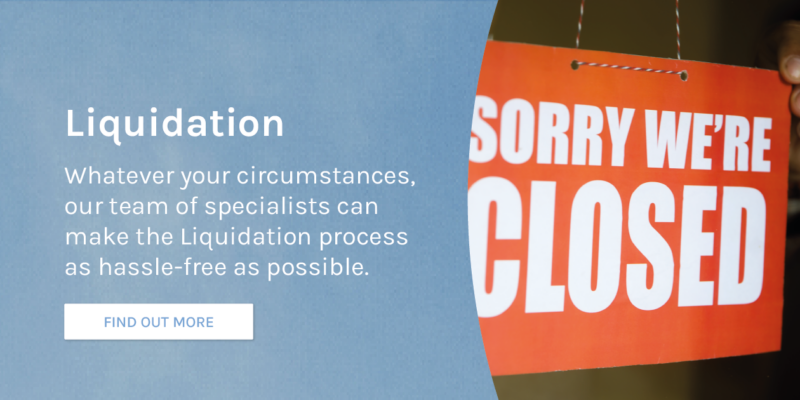In the often intricate and challenging world of business, the term ‘liquidation’, quite rightly, carries a great deal of weight and significance. The process is an often pivotal moment in the life of any business and its management. It signifies the winding down of operations, the sale of assets, and the commitment to repaying all debts and creditors before the doors are closed.
But what does it mean for directors, and can a director resign from a company in liquidation? These questions are vital if you want to explore the unique impact liquidation can have on the role directors have in a business.
As director of a business, entering into liquidation will alter your responsibilities significantly from what you are used to. You will no longer be the primary person responsible for controlling the day-to-day operations, instead you’ll be tasked with assisting the process and playing your role.
If you hold the position of director, it’s important that you have some understanding of the answer to the question “can a director resign from a company in liquidation?”. You will need to understand how it will impact you directly, and the difference this will have if your firm is solvent or not.
What Does Liquidation Mean For a Company Director?
Liquidation entails a company’s operations being wound down, with all assets being sold off to repay debts and creditors. As for ‘what does liquidation mean for a company director?’, you are no longer responsible for any of the day-to-day operations of the business. You instead become solely responsible for co-operating with the liquidation process however possible.
The act of ‘co-operating with the liquidation’ requires the director to work with the liquidator, or whoever may be appointed to manage the liquidation, and provide any information or documentation they may require in order to fulfil their duties.
In addition to this, as director you could be required to attend meetings with the liquidator and creditors, as well as supporting in the sale of company assets.
How Does Liquidation Affect Directors?
Liquidation can have serious and significant ramifications for the director(s) of the business. This includes potential personal liability and damage to corporate reputation, threat of legal action, restrictions on future opportunities, and more. However, the severity of the implications will vary based on whether the firm in question is solvent (able to pay its existing debts) or not.
The impact on directors during solvent liquidation is generally less severe than if their business is insolvent. The director’s can expect more responsibilities and more leeway throughout the process. However, while the impact on directors may be lessened, it’s important that directors don’t see themselves as immune as failing to comply with legal requirements during the process could still result in serious consequences.
Conversely, the director(s) of an insolvent business will be expected to face more significant implications. When a business is unable to pay its outstanding debts, directors have a number of responsibilities that they must fulfil. Insolvent liquidation affects directors in the following ways:
- Greater scrutiny
- Control lost, often permanently
- Disqualification as director (if found negligent)
- Threat of legal action
- Potential impact on credit rating
- Increased possibility of personal liability (in the event of wrongful or fraudulent trading)
The director of an insolvent business should seek professional advice at the earliest possible juncture. The insolvency process can be highly complex, so it’s vital that you have somebody on your side that understands the process from top-to-bottom and can help you to comply with every regulation.
Can I Quit as the Director of a Company in Liquidation?
It is not illegal for the director of a company in liquidation to resign from their position. However, resigning does not, in any way, absolve them from any liabilities or obligation related to their time as director, especially if their actions may have directly led to the company’s insolvency.
For example, a director that is found to have acted inappropriately resulting in the firm becoming insolvent, that has since left to take up a role as director of a new business, can still be ‘punished’ after the fact. They can be found personally liable, faced with legal action, and even be disqualified from being a director and forced to leave their current position.
While a director is within their rights to leave a business in any circumstances, the company’s liquidation complicates matters significantly. There are additional duties and obligations that a director must adhere to during a liquidation. These duties are outlined under The Companies Act 2006, as well as The Insolvency Act 1986.
Under these legislations, the director in question must cooperate fully with the liquidator appointed to the business, and they may be required to provide documentation and explanations regarding the businesses financial dealings prior to liquidation.
Attempting to resign in order to avoid these duties is both ethically irresponsible and can have a knock on effect to your personal and professional reputation, it could also result in serious legal repercussions.
How to Resign a Director of a Company in Liquidation
If you’re wondering “can a director resign from a company in liquidation?”, you should be aware that there are some things you should consider prior to leaving the position. This will vary depending on your specific situation and that of the liquidation itself, as well as the laws and regulations in your area.
There are some important steps you should consider if you, as the director of a company in liquidation, are looking to resign. This includes:
- Consult a Legal Professional: An expert will be able to provide advice specifically tailored to your circumstances. This can be valuable given the often complex circumstance of liquidation, as well as the common hazards that can arise during the process. They can also advise you on the best next steps.
- Review Regulations: Before you resign, you should review the laws and regulations in the jurisdiction your business is based. Different countries will have different rules. So if your business is situated in another country, it is vital that you check.
- Notify the Relevant Parties: If you decide to quit the business, you should first notify all relevant parties. This includes fellow directors, company creditors, shareholders, and the liquidator overseeing the process.
- Report to Companies House: Director resignation must also be reported to Companies House no more than 14 days after the relevant parties have been notified. This step is important to ensure the resignation becomes legally binding.
- Cooperate With Liquidator: The liquidator will likely need to meet with you before you leave the business. The purpose of this meeting will be to ascertain if there is any additional information or documentation you could offer that would assist in the liquidation process. Failure to comply could lead to legal action.
- Attend Necessary Meetings: Depending on the specific circumstances of the liquidation, the director(s) may be required to attend formal meetings with the creditors and shareholders throughout the liquidation process.
Absolutely any failure to comply with the liquidation process, even after liquidation, could result in penalties or even criminal charges.
Contact Inquesta Insolvency For Support When You Need It Most
The corporate world often unfolds and unravels in mysterious and unpredictable ways. Similarly, the role of a director can often change depending on the state of the business.
As a director, facing liquidation can be daunting. It can have a serious and often long-lasting impact on both your personal and professional life.
So, can a director resign from a company in liquidation? While the answer is yes, it is both possible and legal for a director to resign from a company in liquidation, it’s a path full of complexities and pitfalls.
Simply resigning will not offer you an escape route from potential liabilities or responsibilities. It is a decision that should not be taken lightly. The role of a director throughout liquidation involves a number of legal obligations and there are expectations of you that must be met. To navigate this, professional guidance comes highly recommended.
Whether you’re at the helm of a solvent company winding down its affairs before embarking on new opportunities, or you’re faced with the dangers of insolvency, one thing remains true: seeking the experience and expertise of insolvency professionals can guide you through a complex and often stressful time.
Our team of insolvency professionals have years of experience in the field. We can help you to better understand exactly what is expected of you, your obligations, and what risks you could face. We can also help to protect your interests and, ultimately, ensure that you can navigate the process with as much clarity and confidence as possible.
If you need insolvency support, whether that’s Company Voluntary Arrangement, business recovery, or more, get in touch with the Inquesta team today!




